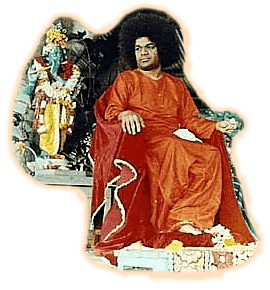|
Other Baba-books
|
||||||||
 |
The original
Sanskrit verses and with comments taken from the writings of
|
|||||||
|
'Na Tapaamsi
Na Teerthaanaam Not by penance
or pilgrimage,
1 2a 2b 3 4 5 6 7 8 9 10 11 12 13 14 15 16 17 18a 18b
"
Listen to this chapter sung! " " Listen to this spoken
chapter in Audio "
The sixth chapter of the Gītā is titled 'ātmā Samyama Yoga'
or the "yoga of controlling the ātmā". This is a misnomer,
inasmuch as it is neither necessary nor possible to control the
immaculate, eternal embodiment of the truth - the ātmā. The
word ātmā in this chapter of the Gītā has been used to denote
the mind. In the ātmā Samyama Yoga, the art of mind control is
dealt with in elaborate detail. Dhyana (meditation) is
mentioned here as the principal means to achieve control over the mind. In
the ātmā samyama, Krishna emphasizes the need for maintaining
absolute cleanliness at the place where meditation is practiced. It is
not your house or the forest that is to be kept clean, but the
immediate surroundings of the place where you perform meditation should
be kept clean. The jīva dwells in the body, while the Lord
resides in the heart. Therefore, since meditation is not so much
performed in external environs as it is within the heart - it being an
internal process - it is more vital to rid the heart of all impurities
and render it a fit abode for God. In our daily lives, when we have to
sit somewhere, we choose a clean place and cover the ground with a
handkerchief or a newspaper. Such being the care we take in cleaning a
place to sit for ourselves, the need for keeping the heart clean, to
seat the Lord therein, and to achieve the purpose of meditation is all
the more important. The necessity for man to cleanse the heart arises
because of the taints of tamas (mode of ignorance, darkness and
slowness) and rajas (mode of passion) that have been associated
with him over several births. - Summer Showers in Brindavan 1979, p. 80 śrī
bhagavān uvāca "Know the Brahman; take up all tasks but
renounce the consequences; giving up the fruit of activity is far
superior to the giving up of activity itself. Karma-yoga is far
superior to karma-sannyāsah." "Well. Superior to both
these is dhyana-yoga. I shall tell you why. Dhyana
needs the support of karma-yoga, so karma-yoga was
first taught to you. Those who renounce the fruits while actively
engaged in karma are very dear to Me; they are the true sannyāsīs,
the real renouncers. I have no affection for those who give up the
ritual fire and desist from all activity except eating, sleeping and
craving for sensory pleasures and behave like Kumbhakarnas [A
brother of Rāvana, who faught against Rāma and attained
liberation (RRV2-2 - RRV2-6b - RRV2-8b)] kinsmen, idling and wasting
their time. I am unapproachably far from idlers." - Gītā Vahini, pp. 88-9 yam
sannyāsam iti prāhur
He
who
has
not
renounced the pursuit of wishes can never become a yogī,
however
busy he may be in sādhana. Only he who is careful not
to get entangled in the senses and who is unattached to the
consequences of his deeds can become a sarva-sanga-parithyāgi
(renouncer of all attachments). - Gītā Vahini, p. 89 ārurukshor
muner yogam yadā hi
nendriyārtheshu Give up the idea that
you are the doer and the beneficiary. You can do this by dedicating
both deed and fruit to the Lord. Then no sin can affect you, for you
are not the doer, and the deed must perforce be holy. Like oil on the
tongue, collyrium on the eye, and a lotus leaf on water, the deed is
with you but not of you. Whatever
you
do
or
hear or see, you remain unaffected, devoid of deeds, innocent
of listening or seeing. The joy derived from the external world opens
the gateways of grief; it is fleeting; but you are eternal, the very
source of bliss, above and beyond all this, the ātmā swarūpa
itself. You are unrelated to these activities that are called deeds and
these consequences that you now mistake as real. You are not the doer;
you
are
just
the witness, the see-er! - Gītā Vahini, p. 88 uddhared
ātmanātmānam bandhur
ātmātmanas tasya
If the mind is not under control and amenable
to one's orders, it can become one's greatest foe. So live in solitude
so that you can master the senses. A horse without reins, a bull unused
to the yoke, and a sadhaka whose senses are not mastered are
like a river without water. Such sādhana is a waste. - Gītā Vahini, p. 89 jitātmanah
praśāntasya The tree of prakriti
(nature) and the branches of desires wither away only
when the mind, the root, is destroyed. - Summer Showers in Brindavan 1979, p. 74 j˝āna-vij˝āna-triptātmā suhrin-mitrāry-udāsīna- yogī
yu˝jīta satatam It is a pity that even
extremely learned pundits at the present time are unaware of the thrill
of putting into practice a single word of the Gītā. What then
are we to say of the unlearned, the ignorant? In short, even some very
reputed exponents of the Gītā are playing false to its
teaching, acting contrary to the message. To the Song of the Lord, each
one adds a fancy note of his own to demonstrate his special twist in
scholarship, or his favorite predilection. Let us consider one example
of this type: The 10th verse of the 6th chapter of the Gītā
declares that parigraha is a great sin [the opposite
word aparigrahah means 'free from desires and feelings of
possessivenesś]. Now
those who accept the Gītā as authority should act accordingly,
avoiding parigraha, is it not so? Parigraha means
'accepting' even for the upkeep of the body and the maintenance of dharma!
These
pracharaks, however, do accept, 99 percent of them!
The
condemnation of parigraha applies to all forms; there are no
modifying circumstances or exceptions. Yet, collections and
contributions are asked for Gītā-yaj˝as, as 'offering' during harathi,
as
expenses
for
the Gītā pracharaka sanghas, as nazar (gift
in
Urdu-language) or kanuka for the guru; lectures are
'sold' for tickets, as entertainment (like the drama and cinema) is
sold. People who do this have no faith in the words of Krishna;
for had they the faith, they would not have behaved in such contrary
ways. If they were convinced that it is wrong, they would not be
tempted to act so. They explain the sloka and feel that their
duty is done; they do not feel the need to follow the advice. That is
the spirit of the times, for this is the age of hypocrisy. People who
watch this type of Gītā prachar lose faith first in the
pracharak and, later, in the Gītā itself.
The publicity dissolves into mere pomp and vanity. - Gītā Vahini, pp. 161-2 śucau
deśe pratishthhāpya tatraikāgram
manah
kritvā chin-mudra One should adopt a
comfortable posture for dhyana. The common practice is to sit,
with the hands in chin-mudra and the legs crossed, on a wooden
plank covered with a soft skin or cloth. These are all, however, part
of dharana (concentration, fixed attention). Dhyana
begins with the process of gradual identification with the Lord and
leads to samādhi. - Summer Showers in Brindavan
1979, p. 88 samam
kāya-śiro-grivam praśāntātmā
vigata-bhīr yu˝jann
evam sadātmānam The mind derives its Sanskrit
name manas because it is constantly engaged in the process of manana
or thinking. Impulses are generated in the mind. Very often, however,
the mind is led astray by conflicting impulses that are generated in
it. The fickle nature of the mind acts as an impediment to man's
spiritual progress and, therefore, it is imperative that every
spiritual aspirant gains control over his mind if he were to drench
himself in the delight of the soul.
- Summer
Showers in Brindavan 1979, p. 79
"So arise, Arjuna! Practice dhyana-yoga. Resolve to
master the senses through this yoga and follow it steadily,
systematically, regularly, at a stated time and in a stated place,
without changing them as the whim takes you. A regular system is
essential for this Yoga. Observe it strictly. Do not alter as
fancy dictates; that will bring about dire consequences." - Gītā Vahini, pp. 91-2 nātyaśnatas
tu
yogo 'sti "For those who eat too
much and get exhausted with the task of assimilating it, for those who
eat less and suffer from exhaustion, for those who sleep too much or
too little, for those who indulge in dhyana according to
'convenience' (that is to say, those who do it for long hours one day,
because they have no other work, and do just token dhyana the
next day, because they have lots of work), and for those who give free
rein to the six inner enemies (kāma, krodha, and the rest), for
those who do not confer joy on parents, and specially the mother - more
than these, for those who entertain doubt and have little faith in the
Lord, or in the guru, whom they have chosen and installed in
their hearts - dhyana will yield no fruit at all." - Gītā Vahini, p. 90 yuktāhāra-vihārasya
The Gītā speaks of
yuktāhāra-vihārasya,
habits
of
feeding
and recreation that are controlled and regulated. The
gross part of food is discarded as feces, the subtle part is
transformed into muscle, blood, etc., and the more subtle of the subtle
aspects are transmuted into the mind and its activities. That is why
the sages have prescribed certain limits and levels of food, in order
to promote the spiritual urges and prevent contrary tendencies. - Sathya Sai Speaks IX, pp. 127-8
There should be discipline and regulation in life in
accordance with self-imposed constraints. These self-imposed
constraints constitute the tapas of an individual. An
unrestrained life is an immoral life. The wind and the sea and also the
other phenomena obey the universal laws of nature. The earth rotates
round its own axis and revolves around the sun periodically. These
uniformities in the universe are the laws ordained by God. They are
obeyed by the macrocosm as well as the microcosm. The laws of nature
ordained by God are necessary for creating and sustaining the universe,
and for maintaining its dynamic equilibrium. Such
self-imposed discipline is conducive to real santhi - peace of
mind, poise, equanimity, and stable equilibrium of the mind. Peace of
mind is the most desirable thing in this world. It gives us physical
and psychical euphoria. - Summer Showers in Brindavan
1979, p. 91 yadā
viniyatam cittam yathā dīpo
nivātastho "The mind of the yoga
adept should be like the steady upright unshaken flame of a lamp, kept
in a windless windowsill. Whenever the slightest sign of unsteadiness
occurs, you should endeavor to curb the mind and not allow it to
wander. Develop the consciousness that you are in all and the feeling
of oneness that all is in you. Then, you will take up and succeed in
all the yogas. Then you are free from all distinctions like 'I'
and 'otherś, or as 'ātmā and paramātmā'. The joy and
grief of others will become equally yours. You can then never harm
others; then all can be loved and adored in the awareness that they are
sarveswara ["the Lord of all"]."Lord Krishna
declared that those who have attained this vision are really the
supremest yogīs. - Gītā Vahini, p. 90 yatroparamate
cittam sukham
ātyantikam yat tad yam labdhvā
cāparam lābham tam vidyād
duhkha-samyoga- sa
niścayena yoktavyo śanaih
śanair uparamed Buddhi
is directly influenced by the ātmā. Therefore, if the mind
follows the buddhi it will be able to lead the senses along the
right path. So Krishna advised Arjuna not to follow the mind,
which, left to itself, is prone to succumbing to the pulls of sensory
pleasures, but instead, to subjugate it to the intelligence. - Summer Showers in Brindavan 1979, p. 75 yato yato
niścalati praśānta-manasam
hy
enam
One does not have to search for Brahman in some distant
place. One should find Brahman in one's daily life in all
things from the smallest thing that one comes across to the biggest
thing that one sees. If, with some reason and with some depth, we make
an enquiry, there is a chance of finding Brahman in our own
heart and within ourselves. Provided we get into a state of meditation,
we can enjoy the bliss of recognizing Brahman everywhere. If
the mind is made steady and unwavering, we can enjoy the permanent
bliss and see the aspect of Brahman. - Summer
Showers
in
Brindavan
1974, p. 55 yu˝jann
evam sadātmānam sarva-bhūta-stham
ātmānam yo mām
paśyati sarvatra sarva-bhūta-sthitam
yo
mām "Arjuna! The one who
sees Me in all and all in Me is dear to Me, whatever be his way of
life", declared Krishna. "That person who worships Me through
all creatures merges in Me"! The Gītācārya continued and said,
"There is a limit for dhyana, but not for the benefits conferred
by it, the siddhi. Dhyana endows man with j˝āna or
supreme
wisdom."
J˝āna
is not mere intellectual gymnastics. It is not a flight of imagination.
Neither is it a mental concoction. It is a continual experience of the
reality of the ātmā. "Only one in a million makes an attempt to
realize the ātmā. Even among them only one in a thousand
understands the process of realizing the ātmā. Among the
thousands of such people only one reaches Me. Those who have achieved
selfrealization and merged in Me are very few indeed", said Krishna
to Arjuna. - Summer Showers in Brindavan
1979, p. 104 ātmaupamyena
sarvatra arjuna uvāca Meanwhile, Arjuna is
beset by doubt and asks for some elucidation and explanation so that he
may get convinced. "Krishna! All you have been telling me is very
pleasant to the ear, and I can well imagine that it must be a source of
ānanda to those who attain success. But it is so
difficult, beyond the reach of all. The yoga wherein everything
has to be realized as equal (samathwam) is fraught with
obstacles even for the fully equiped sadhaka; what then am I to
say of people like me who are common aspirants? Is it possible for us?" - Gītā Vahini, pp. 90-1 ca˝calam hi
manah krishna Waywardness is the
natural characteristic of the mind. That is the way Arjuna described it
to Krishna thus: That is to say, "O, Krishna, the mind is very
wayward; it moves fast; it is very powerful; it is very difficult to
bring under control." - Dhyana Vahini, p. 64 Arjuna complained to Krishna
against the wildness of the mind: he said, it was chanchala
(always changing its objective), pramathi (full of dangerous
possibilities since it makes man a slave to the senses) and dridham
(difficult to destroy). - Sathya Sai Speaks IV, p. 215 The Mind is ever
unsteady; it is "steady in its unsteadiness" as Arjuna complained to Krishna.
It
is
fraught
with disaster; it is deeprooted and difficult to
suppress, says Arjuna. - Sathya Sai Speaks VIII, p.
105 "Krishna!
Is
the
mind
so easily controllable? Alas! Even an elephant cannot drag
as the mind does; it is the nursery of waywardness; its mulishness and
obstinancy are very powerful; it is a terrible shrew. It can never be
caught; it will never halt in one place. It is like capturing the wind
or bundling up water - the attempt to catch the mind and tame it. How
can anyone enter upon yoga with such a mind? One seems as hard
as the other: the twin tasks of controlling the mind and practicing the
yoga. Krishna, you are advising an
impossible task, beyond the capacity of anyone." - Gītā Vahini, p. 91 śrī
bhagavān uvāca The Lord broke
into a smile on hearing these words. "Arjuna! You have described the
mind and known its nature very well. But it is not an impossible task;
the mind can be mastered, however difficult the task might be. "By
systematic practice (abhyāsa: steadiness, fortitude, endurance,
resilience, discipline) and by relentless inquiry (vichara)
and detachment (vairāgya), the mind can be mastered. There is no
task that cannot be accomplished by steady practice. Place faith
in the Lord and practice with the certainty that you have the power and
the grace, and all tasks become easy." - Gītā Vahini, p. 91
Then Krishna replied, "Arjuna, no doubt what you
have said is correct. But by uninterrupted attention and discipline and
by practice of renunciation, it is possible to control it. Hence,
practice dhyanam (meditation), as a first step." Impulses
and
desires
have
to be suppressed in order to get mastery over the
mind. Desires excite the mind and make it rush towards the senses, as a
dog runs after the master. The jīva, poor thing, falls into
meshes of māyā produced by the illusion-creating senses and the
pleasure-pursuing mind! To escape all this agony, one should have
recourse to dhyanam; freed from the clutches of desires and
slavery to the senses. Do japam (mantra-meditation; praying
the vedic way) and dhyanam. Then you can cultivate and develop
along proper lines your will; memory and imagination, too. Without dhyanam,
it
is
not
possible to control and master the mind. All other methods
are as useless, as is the attempt to bind a wild elephant in rut by
means of a thin and tiny thread! Dhyanam is essential to
immerse the mind in the ātmā. - Dhyana Vahini, pp. 64-5
But, the mind can be controlled and even
eliminated by means of intense dhyana on the immanent God.
When that stage is reached, anger, anxiety and envy will cease
bothering you; the bonds of 'I' and 'mine' will break; and you will
have santhi (undisturbed peace). Your efforts must be in
proportion to the grandeur of the gain you envisage, isn't it? You
crave for bliss, but cling to smaller pleasures and refuse to stake as
much as is needed to win it. - Sathya Sai Speaks VI, p. 215 asamyatātmanā
yogo "Therefore,
whoever enters upon this sādhana with determination will gain
the supreme goal, available only for souls transmuted through several
births. Remember, the person who has achieved yoga is superior
to the person who is the master of ritual karma; so strive, o
Arjuna, to become a yogī, to attain that high and holy status.
But this is not all you have to do. There is a status higher than even
this. Whoever fixes his entire consciousness on Me, whoever earnestly
meditates on Me, to the exclusion of everything else, he is superior to
all, he is a mahā-yogī. - Gītā Vahini, pp. 91-2 arjuna uvāca kaccin
nobhaya-vibhrashthaś etan me
samśayam krishna śrī
bhagavān uvāca prāpya
punya-kritām lokān athavā
yogīnām eva tatra tam
buddhi-samyogam pūrvābhyāsena
tenaiva Dhyana is
the process of listening to the Song Celestial, the flute of Krishna,
with
the
mental
ears alert on the melody. Yoga is the merging
of the mind in the bliss of self-forgetfulness, when the music fills
the consciousness. Words like this do not completely denote that
inexpressible ecstasy that one gets while "back home", after this long
exile. - Sathya Sai Speaks VII, p. 291 prayatnād
yatamānas tu tapasvibhyo
'dhiko yogī yogīnām api
sarveshām
The science of rnind-control called yoga has
been developed here (India), since ancient times, and thousands in
every age have practiced it with success, until they achieved its
fruit, self-realization. One result of this self-realization has been
the recognition of every one else as but the reflection of oneself -
the true basis of unity of mankind. - Sathya Sai Speaks V, p. 110 Yama: austerities, first part of ashthānga-yoga, also called the great vow; the don'ts,
what
one abstains from. Other parts are: ahimsa: nonviolence, satya: truthfulness, asteya: non-stealing, brahmacārya, celibacy and aparigraha:
non-appropriation. Nonviolent one becomes effective and without desire
is one of the commitment that gives the right understanding for the
meaning of life. According to Krishna: 'Nonviolence, truthfulness, not coveting or stealing the
property of others, detachment, humility, non-possessiveness, belief in
God, celibacy as also silence, steadiness, forgiveness and
fearlessnesś (see SB 11.19:
33.35).
|
||||||||










